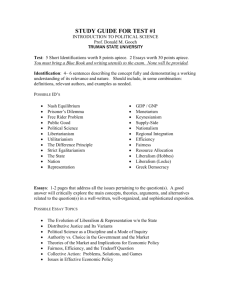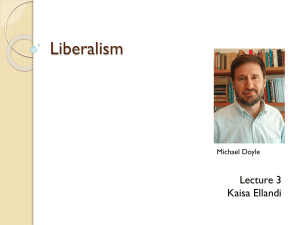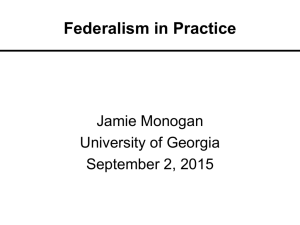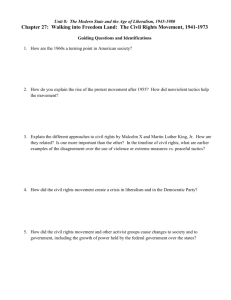Dictatorship - Social Studies 30
advertisement
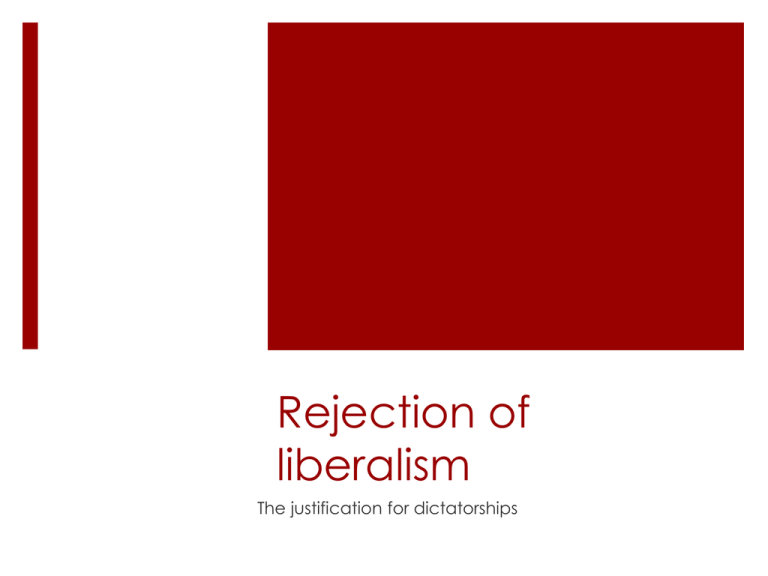
Rejection of liberalism The justification for dictatorships Liberalism is very flexible, which can be beneficial to adapt to changing society; yet it can seem indifferent to principles Classical liberalism - core beliefs social, political and economic values must come from the individual (or they are not justified and can be ignored, the individual decides what is good) the only reality in the world are individuals (not societies, religions, ethnicities) = don’t look to social position (caste, gender), religion or shared characteristics to justify what values are valid o dissolves centuries of the foundations of beliefs laws must be applied to all equally, individuals are esteemed equally o free to pursue own self interest, state ensures those interests don’t interfere with each other (e.g. monopolies, slavery) – political laissezfaire the free market is the way for individuals to achieve their own goals (everyone is equal in opportunity) – economic laissez-faire Three values liberalism fails to address: Order o liberalism encourages people to follow a broad set of rules, (conservatism feels we must do more in order to prevent living a corrupt life) Burke: lose those things that helped us to thrive (get to where we are now); see liberalism as experiments – ignorant of the wisdom of the ages Can be seen in a longing for the good old days, being uncomfortable with social experiments or resisting change (reactionary) Belonging – the need to live a common purpose, be part of something glorious o Fascism: focus more on belonging vs need for order (can be seen in Canada when we cheer for our athletes, “Charger Pride”). individual reason waters down our sense of belonging pluralism means there isn’t one true community and purpose free market promotes competition (lose the feeling of unity), create new economic system to ensure nation will thrive (corporatist state) democracy divides people – competing for votes, petty debates (can be seen in Canada when we feel the need for politicians to get on with ruling, we need a great leader to restore our standing in the world) Freedom – liberalism is a distorted understanding of freedom o Revolutionary socialism (communism * most communist nations recognize they have not yet reached the ideal of communism, and refer to themselves as socialists) freeing people from religion, institutions, culture and social norms free market economy enslaves individuals (focuses on the needs of the market, instead of the market following our needs [self-actualization, creative expression]). real freedom = take control over the economy so that it meets the demands of our humanity (not the demands of profit) - Business cycle is a symptom of the illness of liberalism. Once true communism is established, there will be no need for government as people will govern themselves = the goal of liberals! When we feel we should be recognized for who we are, not the money in our pockets, that is an echo of communism How viable is liberalism in regions that are not liberal, like theocracies? Liberalism is only one way of seeing the world, the issue is if the ideology can answer the needs of individuals/humans (liberals focus on freedom, others may focus on values of order or belonging; but all three need to be addressed) Dictatorship government by the “elite” Justifications Goals of the state are above selfish individual objectives, therefore the collective welfare of the state must prevail over the privileges of the individual Only certain people are sufficiently intelligent and energetic to rule Unless people’s beliefs and actions are strictly controlled, social organization will break down Model Dictatorship Elite makes all public decisions There is no respect for the political rights of individuals and groups that are not part of the elite, therefore there is no place for freedom of speech and assembly, or for political and legal equality. It is based on the assumption that only the elite have anything useful to contribute; people are unequal and may not compete with their rulers Classifications of Dictatorships Autocracy – rule by one person (e.g. Henry VIII) Oligarchy – rule by a group (e.g. the Taliban in Afghanistan) Majority Tyranny – rule by a majority without respect for minority rights (US prior to the civil rights movement; South Africa with Apartheid – minority tyranny) Techniques Force – drawback: very expensive in terms of time, personnel and other resourced; it can also create a new opposition Indoctrination and propaganda – especially effective in the educational system Direction of popular discontent – build up hatred against real or imagined enemies to divert attention away from the government (scapegoat) Controlled participation – people are given the appearance of having a voice in government; tokenism: giving a fairly high (conspicuous) office to a member of a dissident group Dictatorships vs Totalitarianism All totalitarian regimes are dictatorships, but not all dictatorships are totalitarian Basic Characteristics An official plan covers all vital aspects of human existence Single mass party, usually under one leader Government monopoly of police and weapons Party controls all means of mass communication Tight control of the economy Based on the theories of Carlyle, Nietzsche and Hitler: Great Man Theory, man of destiny Totalitarian dictatorships claim total control of the society. They are an extreme version of an ideological one-party dictatorship; everything is political. The difference between dictatorship and totalitarianism is in the scope and location of government power.
